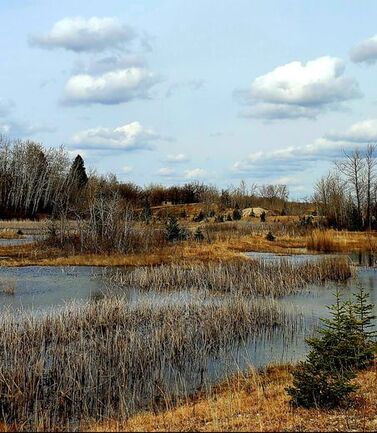Wetland Conservation Act (WCA)

The Minnesota Legislature enacted the Wetland Conservation Act (WCA) in 1991 recognizing the important benefits of wetlands. The law regulates draining and filling wetlands and, if wetland loss is unavoidable, requires replacement. The law is one of the most comprehensive state wetland protection laws and has been used as a model for other states.
Because local officials generally have a good grasp of community needs and values, the WCA gives administrative authority for the act to local governments. The local government unit that delegates this program in Kittson County is the Kittson Soil and Water Conservation District (SWCD). The Minnesota Board of Water and Soil Resources (BWSR) oversees the act on the state level.
What is a wetland?
When most people think of wetlands, they picture swampy, marshy areas complete with ducks and cattails. While those areas are indeed wetland, many other wetlands look quite different and may eve be completely dry for the majority of the year. A wetland is defined by three criteria: 1) It must have mostly hydric soils; 2) Is must be generally inundated or saturated above or below the surface; and 3) It must support a prevalence of vegetation adapted to wet soil conditions. A private consultant can help you determine if an area is a wetland.
Do you have a wetland on your property?
This link takes you to a map of Minnesota that identifies national wetlands
https://arcgis.dnr.state.mn.us/ewr/wetlandfinder/
Why are wetlands so important?
Wetlands have been considered wasted space and drained and filled for development and crop production for many years. In Minnesota, an estimated 11 million acres of wetlands have been lost over the last 100 years, leaving about 7.5 million acres. This represents a 60% loss. Far from being useless, wetlands proved many important benefits, which have only become apparent as wetland numbers have dwindled. These benefits include:
· Wetlands reduce flooding by slowing excess water runoff during times of heavy rainfall.
· Wetlands improve water quality by filtering sediment, nutrients and toxic substances out of water before it washes into rivers/ditches.
· Wetlands provide habitat for many fish, wildlife and plants.
Contact the Kittson SWCD for local wetland information and find out if the land to be altered is a wetland. The Kittson SWCD can help you with all the appropriate steps.
For more information from the state click here.
Because local officials generally have a good grasp of community needs and values, the WCA gives administrative authority for the act to local governments. The local government unit that delegates this program in Kittson County is the Kittson Soil and Water Conservation District (SWCD). The Minnesota Board of Water and Soil Resources (BWSR) oversees the act on the state level.
What is a wetland?
When most people think of wetlands, they picture swampy, marshy areas complete with ducks and cattails. While those areas are indeed wetland, many other wetlands look quite different and may eve be completely dry for the majority of the year. A wetland is defined by three criteria: 1) It must have mostly hydric soils; 2) Is must be generally inundated or saturated above or below the surface; and 3) It must support a prevalence of vegetation adapted to wet soil conditions. A private consultant can help you determine if an area is a wetland.
Do you have a wetland on your property?
This link takes you to a map of Minnesota that identifies national wetlands
https://arcgis.dnr.state.mn.us/ewr/wetlandfinder/
Why are wetlands so important?
Wetlands have been considered wasted space and drained and filled for development and crop production for many years. In Minnesota, an estimated 11 million acres of wetlands have been lost over the last 100 years, leaving about 7.5 million acres. This represents a 60% loss. Far from being useless, wetlands proved many important benefits, which have only become apparent as wetland numbers have dwindled. These benefits include:
· Wetlands reduce flooding by slowing excess water runoff during times of heavy rainfall.
· Wetlands improve water quality by filtering sediment, nutrients and toxic substances out of water before it washes into rivers/ditches.
· Wetlands provide habitat for many fish, wildlife and plants.
Contact the Kittson SWCD for local wetland information and find out if the land to be altered is a wetland. The Kittson SWCD can help you with all the appropriate steps.
For more information from the state click here.